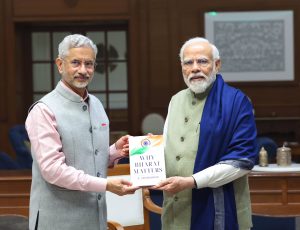During an election year, members of a democratic cabinet are expected to help their principal get reelected, in addition to their other duties. Cabinet members responsible for national security are often exempted from these chores, but most find a way to contribute to the reelection effort. With the publication of “Why Bharat Matters” (Rupa Publications, January 2024) and subsequent discussions of the book, Minister of External Affairs Subramanyam Jaishankar is certainly doing his bit for the reelection of Prime Minister Narendra Modi.
The title itself indicates the domestic political orientation of the book. Gone is the “India” of Jaishankar’s previous book “The India Way”(Harper Collins, 2022), replaced by the “Bharat” of Modi’s Bharatiya Janata Party (BJP) and Modi’s preferred designation for the country in English or any other language.
The preface to the new book contains a paean to Modi. Throughout the book, Jaishankar draws parallels between India’s rise under Modi and episodes in the Hindu epic, Ramayana (the story of Lord Rama), at a time when the inaugural of the Ayodhya Ram Mandir on the site of a destroyed Muslim mosque is a focus of BJP political messaging and may result in the moving up of the time for national elections.
The takedown of Jawaharlal Nehru (who just happens to be the great-grandfather of the political opposition to Modi), and his many mistakes in dealing with China, is complete. The condemnation of Pakistan is full-throated, leaves no room for compromise, and is bound to raise the ardor of Bharat voters. Overall, the tone is triumphal, stemming from the ascension of Modi to the position of prime minister in 2014 with little consideration for the achievements of the pre-Modi period (even those in which Jaishankar was involved) or, much less, where Modi’s leadership might be improved on such matters as planned assassinations on foreign soil of Sikh separatists.
However, it would be wrong to dismiss “Why Bharat Matters” as simply a political text. The thought of Jaishankar, holder of a Master’s degree and a doctorate with some 50 years of diplomatic experience, is far too brilliant and influential to ignore. His latest book shows that his thinking on statecraft has progressed in significant ways since becoming minister. For example, Jaishankar exhibits throughout his latest book a greater appreciation for the fact that, in the real world, strategic or political issues are not separate from the economic, cultural, and ideological factors that influence relations among nations.
Also, the emphasis on Bharat’s colonial past as 200 years of national humiliation, is largely ignored in favor of a forward look to the new challenges that face the nation. Jaishankar takes on the Indian diplomatic shibboleths of “strategic autonomy” and “non-alignment” regarding relations with Western nations. This is perhaps best indicated by his strong advocacy of the Quad, the grouping of the U.S., Japan, Australia and India, which has an increasing role as a counterweight to China.
However, Jaishankar’s view of such multi-lateral organizations as the United Nations and its Security Council shows a lack of appreciation for the circumstances that brought them into being. In “Why Bharat Matters,” he goes so far as to designate the architecture of the post-World War II multilateral organizations as a “trick” of the victors of WW II to keep them in power. The consequence of this perspective is an underappreciation of the effect of the nature of generalized war (over 60 million people perished in WW II) on the structure of the United Nations. Mahatma Gandhi is mentioned only in conjunction with his alleged mistake in choosing Nehru over Patel, and Gandhian principles, including non-violence, are absent.
Also, largely absent is the need for Bharat to make common cause, through measures of substance, to prevent a recurrence of world war. The corollary to this lack of appreciation for the devastating impact of WWII on the formation of multilateral institutions is an underappreciation of the need for multilateral organizations to prevent war with nuclear weapons, a war that has the potential to kill many times more than the 60 million killed in WWII and to leave the planet poisoned for future generations.
A logical partner for India in waging peace worldwide through multilateral organizations and otherwise is the United States. Regarding the United States, Jaishankar exhibits a marked ambivalence. On the one hand, he sees the U.S. as a valuable source of technology, arms, and economic wherewithal in Bharat’s upward march to the highest rank of international power, and particularly useful against China. On the other hand, he seems to see the U.S. as the leader of developed countries trying to keep their international power positions from being eroded by such emerging powers as Bharat.
In using the resources of the United States, there is no room for such a romantic notion as friendship but only a hard-headed assessment of Bharat’s immediate interests, interests that are focused first on Bharat and its immediate neighborhood and particularly its border issues with China and Pakistan. Jaishankar’s view of Bharat in relation to the Global South seems to be as a leader of nations seeking to overcome an order led by the United States.
Jaishankar lauds the wisdom of Bharat under Modi to reach out to all nations as family members, which draws on the ancient Hindu concept of Vasudhaiva Kutumbakam (the World is One Family) and was the theme of India’s chairmanship of the G-20. However, the concept of family does not necessarily solve international problems of peace and war. As Jaishankar had shown in the use of another Hindu epic, the Mahabharata, as a paradigm in ‘The India Way,’ some of the most deadly and devastating aspects of relations occur within families.
Still to come from Minister Jaishankar is why Bharat matters through effective measures to wage peace rather than simply climbing the international power rankings.

































